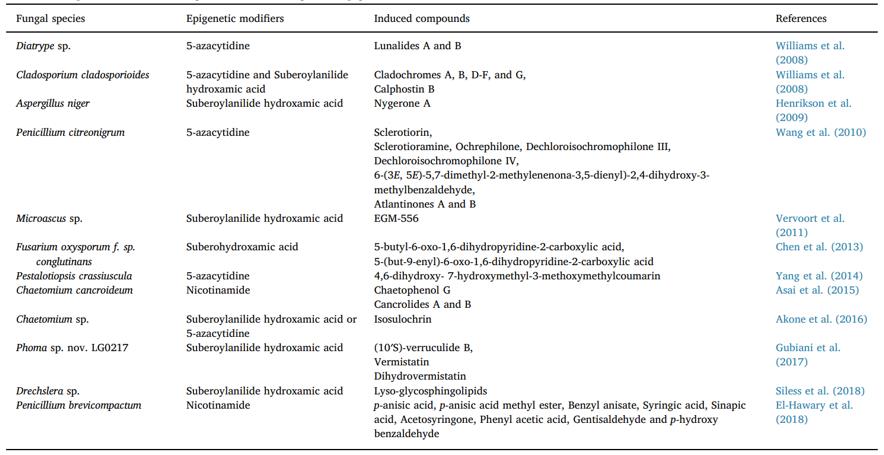Whole-genome sequencing has identified a large number of genes encoding compounds in fungi. Still, the number of compounds encoded by these genes is much larger than the number of compounds currently isolated from them. Epigenetics refers to heritable changes in gene expression without altering the gene sequence. Numerous studies have shown that epigenetic modifications are closely associated with synthesizing secondary metabolites.
 Table 1. Selected compounds induced through the treatment of fungi with epigenetic modifiers. (Toghueo RMK, et al., 2020)
Table 1. Selected compounds induced through the treatment of fungi with epigenetic modifiers. (Toghueo RMK, et al., 2020)
Epigenetic manipulation can alter the secondary metabolite profile of fungi on a large scale and activate the biosynthesis of a large number of secondary metabolites. Lifeasible can achieve activation of silenced fungal gene clusters using epigenetic small molecule inhibitors and epigenetic modifier enzyme gene knockdown or overexpression techniques and to analyze the impact of epigenetic regulation on fungal secondary metabolite profiles.
| DNA Methyltransferase Inhibitor | N-Phthalyl-L-tryptophan |
| 5-Azacytidine | |
| Methylthioadenosine | |
| Histone Deacetylase Inhibitor | Vorinostat |
| Nicotinamide | |
| Sodium Butyrate | |
| Valproic Acid | |
| Histone acetyltransferase | Anacardic Acid |
Lifeasible can facilitate chromatin network changes using epigenetic modifiers or gene editing techniques to analyze the secondary metabolite profile expressed after epigenetic regulation fully. As your trusted partner, we can meet all your fungal phylogenetic analysis needs and provide you with efficient and high-quality services. If you want to know the details, please contact us.
Reference
Lifeasible has established a one-stop service platform for plants. In addition to obtaining customized solutions for plant genetic engineering, customers can also conduct follow-up analysis and research on plants through our analysis platform. The analytical services we provide include but are not limited to the following:
July 13, 2024